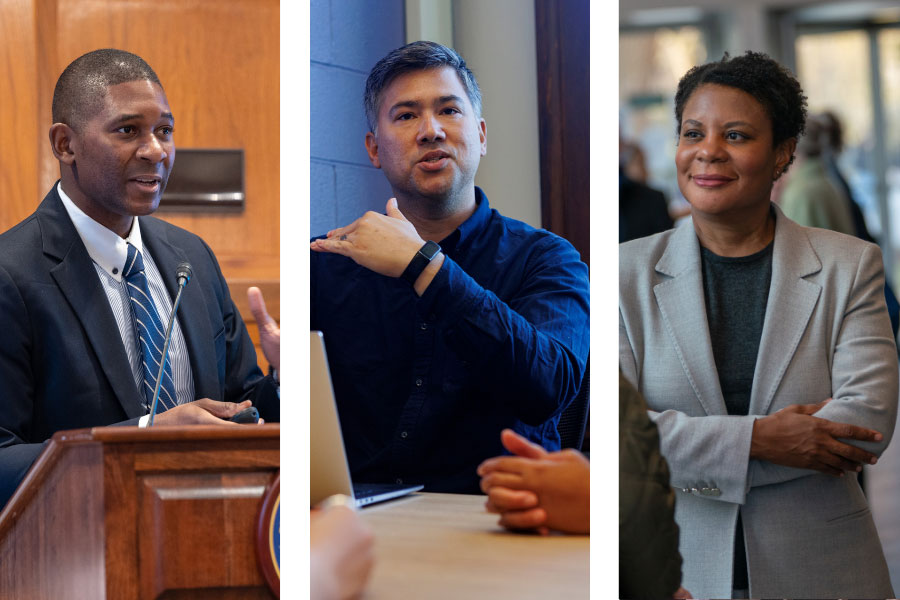Looking Back at Our Favorite IPR Stories from 2024
Our research and events examined the replication crisis, AI, and how to make neighborhoods more equitable
Get all our news
These articles highlight one of IPR’s superpowers—our supportive interdisciplinary community. ”
Andrew Papachristos
IPR Director

In 2024, IPR’s researchers explored pressing social issues, including the replication crisis and the mental health effects of school shootings on kids and teenagers. It was also a big year for new faculty with six fellows and eight associates joining IPR, making it our largest incoming cohort since 2016.
IPR research had a significant policy impact in 2024, showing up in the U.S. Surgeon General’s report on gun violence and the White House's Council of Economic Advisers annual report. Our events this year continued to bring people together locally and nationally around policy-relevant research, including the first early childhood conference in Chicago in seven years and a Capitol Hill policy briefing on neighborhood inequality.
“These articles highlight one of IPR’s superpowers—our supportive interdisciplinary community,” said IPR Director Andrew Papachristos, the John G. Searle Professor of Sociology. “Our approach, honed over more than five decades, allows our faculty to glean insights from other disciplines and produce rigorous, policy-relevant work with impact.”
Read more about some of our research, events, and policy impact highlights over the last year.
Research Excellence
The Replication Crisis: ‘An Existential Crisis’ for Science
The replication crisis, or the inability of scientists to obtain the same results previous investigators found, threatens the scientific enterprise, leading to questions not just about research practices and methods, but the very reliability of results. How are researchers working to address the replication crisis? IPR faculty experts Larry Hedges, Brian Uzzi, Jennifer Tackett, and Jessica Hullman shed light on how science can repair itself.
Looking Back at the 1924 Indian Citizenship Act
While Native Americans can trace their ancestry in what is now the United States back thousands of years, they were only granted U.S. citizenship in the last century through the 1924 Indian Citizenship Act. To mark the 100th anniversary of the passage of the act last June, IPR sociologist Beth Redbird and historian and IPR associate Doug Kiel discuss its history and how it refined what it means to be Native American.
The Mental Health Effects of School Shootings
School shootings are an all-too-common reality for a growing number of American students. A study by IPR economists Molly Schnell and Hannes Schwandt finds that the use of prescription drugs to treat mental health conditions, including depression and anxiety, increased by over 25% among youth living near fatal school shootings. Five and a half years later, the use of these medications remained high.
Policy Impact
Five IPR Faculty Cited in Surgeon General's Report on Gun Violence
This summer, the U.S. Surgeon General declared gun violence a public health crisis due to the sharp rise in firearm injuries since 2020. The report includes IPR faculty research on gun violence statistics, including the impact on children and teenagers, and effective interventions to prevent firearm injuries and fatalities. It cited work by Rinad Beidas, Andrew Papachristos, Molly Schnell, Hannes Schwandt, and Linda Teplin.
IPR Research Drives Policy Solutions in White House Economic Report
The White House's Council of Economic Advisers 2024 annual report, co-authored by IPR economist Kirabo Jackson, dives into economic challenges like the aging workforce and the drug overdose crisis. The report presents policymakers with possible solutions with the support of research from top academics, including insights from faculty experts Jonathan Guryan, Benjamin Jones, Molly Schnell, and Hannes Schwandt.
IPR Policy Briefing Explores How to Make U.S. Neighborhoods More Equitable
On Oct. 9, IPR held a policy research briefing on Capitol Hill to examine the persistent disparities in neighborhoods across the U.S. During the briefing, IPR faculty experts Andrew Papachristos and Kirabo Jackson, with Johns Hopkins’ Stefanie DeLuca, and Stanford’s Sean Reardon explored how policies addressing housing, education, and public safety can help bridge the gap.
Community
Fourteen New Faculty Join IPR to Strengthen Policy Innovation
This fall, IPR welcomed 14 faculty—six fellows and eight associates—making it our largest incoming cohort since 2016. Tackling issues from artificial intelligence and teen brain development to workplace equity and racial disparities in language use, IPR’s newest faculty members add their research expertise to the more than 170 faculty from 30 disciplines currently providing data-driven insights vital for evidence-based policymaking.
Alondra Nelson Shares How to Harness the Power of AI
AI has the potential to make our lives easier and better—and in many ways, it already has—but how do we enjoy the benefits of AI while keeping its risks in check? In a joint IPR and Medill Distinguished Public Policy Lecture on March 27, sociologist and former White House official Alondra Nelson shared insights on how we should govern AI, taken from her work in the Biden administration and her own research.
Bringing Chicago’s Early Childhood Community Together
On June 10 in Chicago, nearly 250 attendees gathered for the city’s first early childhood research conference in seven years. Hosted by the Early Childhood Research Alliance of Chicago (EC*REACH), the launch conference brought together researchers, educators, policymakers, funders, and community organizers. Led by faculty co-directors Terri Sabol and Diane Whitmore Schanzenbach, with executive leaders Maia Connors and John Q. Easton, EC*REACH seeks to be a research hub in the city.
Photo credits: photo of Kirabo Jackson taken by Leslie Kossoff, photo of Michael Kraus taken by Laura McDermott, photo of Alondra Nelson taken by Rob Hart
Published: December 16, 2024.


